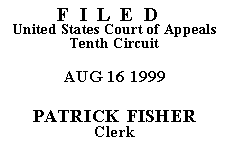

| UNITED STATES OF AMERICA,
EDWARD DRYDEN, |
No. 98-3331
(D.C. Nos. 93-20048-04-JWL
and 96-3421-JWL |
Dryden next filed a pro-se motion to vacate, set aside, or correct his conviction and/or sentence pursuant to 28 U.S.C. § 2255, asserting inter alia, that his trial lawyer provided constitutionally ineffective assistance of counsel in several respects, which the district court denied. See United States v. Dryden, No. Civ. 96-3421-JWL, 1997 WL 94238, at *1-*2, *5 (D. Kan. Feb. 26, 1997). This court reversed as to Dryden's claim that "his counsel acted ineffectively by failing affirmatively to inform him that it was Dryden's decision whether or not to testify on his own behalf." United States v. Dryden, No. 97-3280, 1998 WL 930582, **1-**2 (10th Cir. Apr. 22, 1998). We, therefore, remanded the case to the district court "to hold an evidentiary hearing on the ineffective counsel issue." Id. at **2.
On June 23, 1998, the district court held an evidentiary hearing on the specific issue of whether Dryden's trial lawyer provided constitutionally ineffective assistance of counsel in failing to inform Dryden of his right decide whether to testify in his own behalf. The district court found that Dryden's lawyer adequately informed Dryden of his right to decide whether to testify, and therefore did not provide deficient performance, and that any arguable deficient performance on the part of Dryden's lawyer did not prejudice Dryden. (See United States v. Dryden, No. 96-3421, at 3 (D. Kan. Aug. 20, 1998) (unpublished).)
On April 15, 1999, Dryden filed, before this court, a motion for leave to proceed on appeal in forma pauperis and an application for certificate of appealability ("COA"). Because Dryden has failed to make a "substantial showing of the denial of a constitutional right," as required under 28 U.S.C. § 2253(c), we deny his application for a COA. We also deny Dryden's motion for leave to proceed in forma pauperis.
The mandate shall issue forthwith.
ENTERED FOR THE COURT
David M. Ebel
Circuit Judge
*.After examining appellant's brief and the appellate record, this panel has determined unanimously that oral argument would not materially assist the determination of this appeal. See Fed. R. App. P. 34(a)(2) and 10th Cir. R. 34.1(G). The case is therefore ordered submitted without oral argument. This Order and Judgment is not binding precedent, except under the doctrines of law of the case, res judicata, and collateral estoppel. The court generally disfavors the citation of orders and judgments; nevertheless, an order and judgment may be cited under the terms and conditions of 10th Cir. R. 36.3.